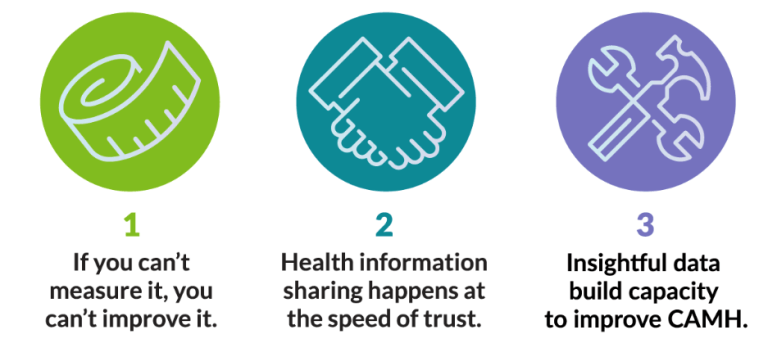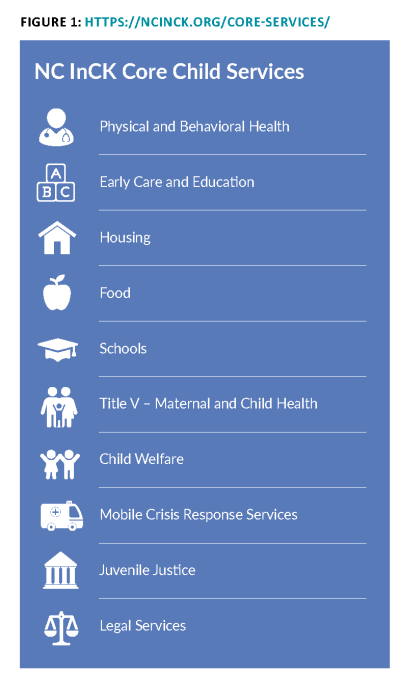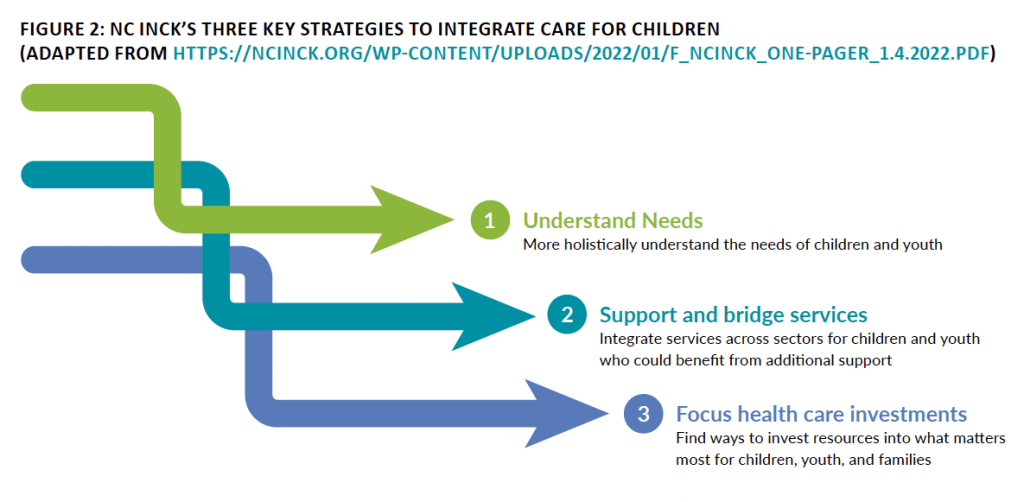Linking data across state agencies to integrate care for North Carolina children
An innovative partnership aims to combine services for children and youth across sectors and focus healthcare resources on the issues that matter most to children, youth and families
at a glance
North Carolina Integrated Care for Kids (NC InCK) is integrating care and services to improve the health and well-being of children in North Carolina.
NC InCK represents a partnership among the North Carolina Department of Health and Human Services (NC DHHS), Duke University School of Medicine and the University of North Carolina (UNC) Health System, which is supported with funding from the Centers for Medicare & Medicaid Services (CMS). Through this innovative partnership, NC InCK aims to better understand the needs of children and youth, integrate services for children and youth across sectors, and focus healthcare resources on the issues that matter most to children, youth and families.
Public health challenge
1Centers for Disease Control and Prevention (CDC).
https://www.cdc.gov/mmwr/volumes/71/su/su7102a1.htm


APPROACH
In 2020, a group of leaders from the NC DHHS, Duke and UNC recognized an opportunity to not only address the aforementioned challenges but also to build an innovative model to improve care for children and families insured by Medicaid throughout a five county region in the state. When the federal government released a funding opportunity through the Centers for Medicare and Medicaid Innovation Office (CMMI),2 leaders from the NC DHHS, Duke and UNC came together to develop a funding application to support the creation of NC InCK. The NC InCK leadership team then went on to build a coalition of child health leaders from across the NC InCK region and state. The coalition includes public and private groups within the healthcare system (e.g., healthcare providers, insurance companies) and those from core child service entities outside of healthcare (e.g., schools, childcare programs for infants and toddlers).

Working collaboratively with communities in their target area, NC InCK sought to better understand the root causes of poor child health outcomes. Through this process, they learned that too many children were experiencing behavioral health concerns and were not receiving appropriate support, and many children were experiencing risk factors such as food insecurity and housing instability. They quickly realized that the challenges experienced by many children and families are too complex and multifaceted to be addressed within healthcare systems alone. As a result, NC InCK aims to integrate core child services beyond healthcare to support more holistic care for children and families (Figure 1). NC InCK currently works with organizations and systems, such as child welfare, early care and education, food and nutrition services, federally funded and community housing programs, juvenile justice, legal aid, schools, and others to coordinate services for children and their families.

For the first time in North Carolina, data from each of these organizations and systems is being used by NC InCK to identify and provide services to children and their families. For example, NC DHHS provides data on emergency room visits and hospitalizations, behavioral health, foster care status, guardian health status, food insecurity, housing instability, and medical conditions. The NC Department of Public Safety provides juvenile justice data related to stays in detention and Youth Development Centers, probation, diversion and community intake. The NC Department of Public Instruction provides data on school attendance and absences, in-school suspensions, out-of-school suspensions, expulsions and enrollment.
In addition, the NC InCK model includes enhanced care management to support the delivery of high-quality health care for children and an alternative payment model for the medical providers who deliver these services. Children in NC InCK are eligible for pediatric care management provided by specialized care teams. Family Navigators take on the role of single point of contact for a subset of NC InCK members who can benefit from NC InCK’s integrated care model (Figure 2). Children are prioritized based on the linked data mentioned above and/or community referrals from schools and juvenile justice partners. The NC InCK alternative payment model also includes six performance measures designed to enhance whole-child health. NC InCK attributes their ability to conduct all of these activities to the trust and relationships that have been established among the NC InCK team.

impact
Although NC InCK has not yet been in existence long enough to fully assess or achieve its overall intended impact, NC InCK is gathering and using data for continuous program improvement. Even at this early stage, NC InCK has demonstrated that trust and rapport are keys to successful collaboration across multiple sectors, and family engagement is crucial in improving crosssector care management. Over time, NC InCK intends to demonstrate additional program outcomes related to access to healthcare and other services, return-on-investment related to the alternative payment model, and the overall impact of the integrated care model on the health and well-being of children, youth and families.
WHAT'S NEXT?
Over the next several years of the project, NC InCK will focus on fully implementing the alternative payment model and achieving integrated care management for the children and families they serve. In addition, they will be evaluating their efforts and seeking opportunities to tell the story about what NC InCK is doing and the impact they are achieving. During this time, NC InCK will also be working to sustain their impact on strengthening integrated care for children in North Carolina after the end of the federal funding period in 2026.
RESOURCES
Rushina Cholera, MD, PhD | Executive Director, North Carolina Integrated Care for Kids: rushina.cholera@duke.edu
